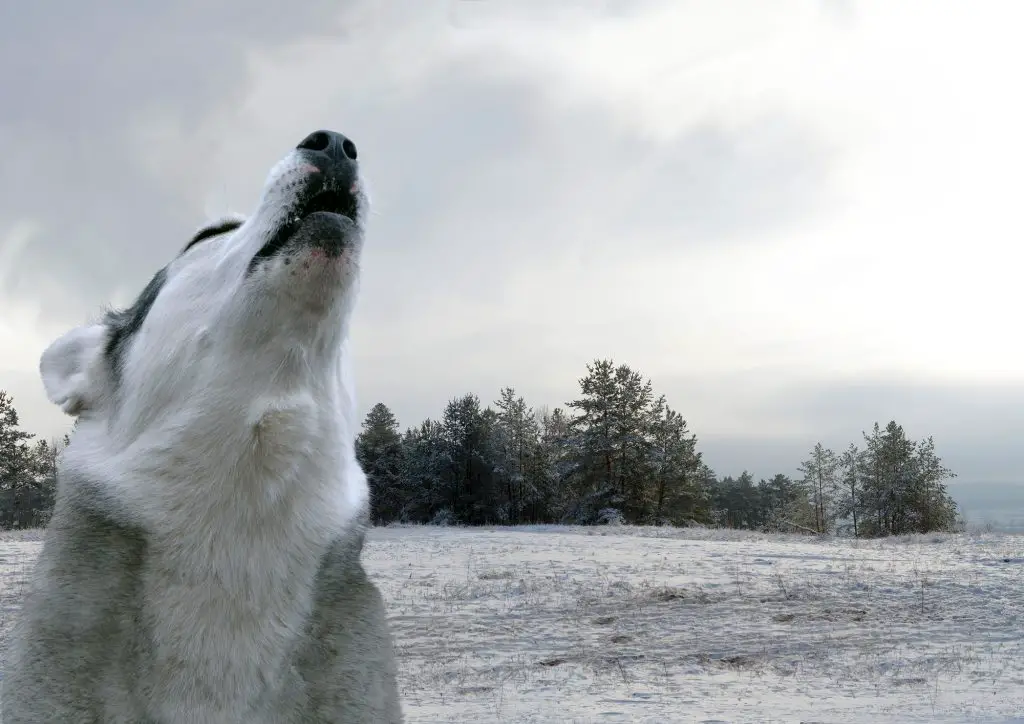We’ve all heard dogs howl at least once. Whether your canine just randomly started howling or was responding to another dog howling a few houses down, howls are a typical way many dogs communicate. Just like humans have their preferences for forms of communication though, some dogs howl more than others.
The amount a dog howls depends on the breed and their personality. One dog might only howl once or twice in their whole lifetime, while another might howl nearly every day. Quiet kinds like Whippet mixes hardly howl at all. On the other hand, dogs like beagles and some other hunting dogs howl all the time.
Dog Communication
Dogs communicate in a variety of different ways. Compared to all the ways dogs communicate, howling is one of the least common vocalizations you might hear.
- Barking. Barking is probably one of the most widely recognized vocalizations dogs make. Every dog probably barks at least once a day, unless it belongs to one of the extremely quiet dog breeds. Barking is used in many different situations, including surprise, initiating play, and threatening others.
- Non-verbal communication. While we may not always see it, non-verbal communication is the most common form of communication dogs use to tell others what’s on their mind. Dogs are continually using their bodies to speak to other dogs and us.
- Growls, whines, and other vocalizations. After barking, you’ll probably mostly hear growls, whines, and different auditory sounds. These sounds differ in meaning depending on the situation and context, and they don’t always mean what you think they mean. For instance, growling is often used by Siberian Huskies as another form of barking, not a signal of aggression.
So, where does howling fit into all of this?

Types of Dog Howls (and What They Mean)
While our human ears might not be able to recognize it, there are many different kinds of howls. What each cry sounds like will vary from dog to dog. Smaller dogs are going to have a higher-pitched howl, while a bigger dog’s howl will be lower.
Because of this, it is essential to consider a dog’s body language as well as your own dog’s particular personality.
While both domestic dogs and wolves howl, they do so for different reasons. Here are some of the most common reasons dogs of all sort howl:
- Separation anxiety is a common, troublesome reason a dog might howl. This type of howling will happen when a dog is separated from “their person” and is paired with other anxiety symptoms. This is especially common in dogs going through rehoming.
- Some dogs might howl due to pain or other medical issues. While most dogs will be quieter and try to hide when hurt, others will vocalize even more than usual.
- Other dogs will howl in response to another sound, like a siren or another dog. This is one of the most common reasons a dog will howl. This type of howling is innate in their genetics and comes from a time when they have to communicate with pack members over long distances.
- Rarely, dogs will howl for attention. This is one of the least common reasons a dog will howl. However, if you have previously given your dog attention when he was howling for a different purpose, they might learn that howling gets them attention and cuddles. This can create troublesome attention-howling.
- You might hear dogs howling while they’re hunting. These howling dogs are usually Beagles or another breed that bays while following a scent trail.
What to Do About Excessive Howling
The way you can prevent or stop howling depends on why your dog was howling, to begin with. If your dog is howling because of separation anxiety, you will need to help them overcome this severe disorder first. There are man ways to do this at home, but you may want to seek the help of a behaviorist if the condition is critical.
If your dog howls at loud noises like sirens, there are a couple of things you can do to prevent more episodes. You can try to desensitize your dog to these noises by slowly introducing them to these sounds throughout the day, making them more “normal” and decreasing the chance that your dog will react to them negatively.
You can also teach your dog a ’quiet’ command to stop howling in an instant when you’re nearby. Of course, this only works if you’re there to give your dog the command, so it is less helpful if your dog howls while you’re away.
Furthermore, to teach your dog this command, they will also need to know the “speak” command. If your dog already knows this command, great. Otherwise, you will have to teach it to them first, which can take some time. Highly trainable dogs and those who have already gone through a dog training course are going to catch on to these new commands faster.
Learn More: Best Tasting Dog Foods
